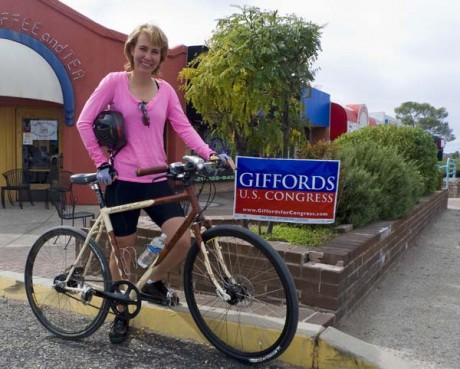January 11, 2011
Three days ago, Congresswoman Gabrielle Giffords of Arizona was among 13 people wounded in an attack by a gunman in Tucson that killed six others, including a 9-year-old girl. (At the time of this writing, Giffords is still in critical condition from the gunshot to the head, and doctors are guardedly optimistic about her survival and recovery.)

We at Commute by Bike are deeply affected by the attack, and our thoughts are with the families of those killed in the attack, along with the wounded and their families.
Last week I began wondering who are the American leaders who “put cycling into practice as well as pose for photos and propose legislation.”
Although Commute by Bike is based in Flagstaff, Arizona, it was only yesterday that I learned Giffords is one of those rare leaders who commute by bike.
Giffords says bicycling is a critical part of urban infrastructure. She says she biked a lot while getting her Master's degree in planning at Cornell and that bike and pedestrian planning is an important part of urban planning.
She loves that Tucson is a top-10 biking city and that the city makes bicycling a priority. Giffords says she supports all types of alternative transportation from bike infrastructure to projects like the modern streetcar.
[…]
Giffords rides her bike from her home in Washington D.C. to the capitol building. She says the ride is breathtaking and inspiring.
Giffords represents us, as Americans, Arizonans, and as cyclists. We wish her a full and speedy recovery, and many more bike commutes.
Much has been written already about the political and rhetorical climate that may have contributed to the gunman’s motives. The consensus is that politicians and pundits need to tone it down.
In his press conference the day of the shooting, Pima County Sherrif, Clarence Dupnik said it with extraordinary clarity:
It’s the vitriolic rhetoric that we hear day in and day out from people in the radio business and some people in the TV business.
When you look at unbalanced people, how they respond to the vitriol that comes out of certain mouths about tearing down the government, the anger, the hatred, the bigotry that goes on in this county is getting to be outrageous.
My thoughts were drawn, once again, to the rhetoric of the debate over cycling infrastructure, referred to as “The Bike Wars” or a “war on cars.” War? Really? With armies, weapons, and battles?
Anyone who commutes by bike knows two things: First, that there are a lot of crazy and unstable drivers out there, and second that with the wrong person behind the wheel, a car can be used as a weapon. When we, the participants in this debate, regurgitate this “war” framing, we need to consider the chances that a crazy motorist might take it seriously. The motorist who believes (because he’s been told so) that cyclists are literally the enemy; that cyclists are threatening his way of life, how is he likely to use his car?
Let’s downshift our rhetoric. It’s not a war. It’s a disagreement over transportation priorities; it’s motorists and cyclists struggling to reconcile their differences and coexist.
As we reflect upon the tragedy in Tucson and mourn this loss, let’s take this opportunity to consider the impact of inflammatory language not only in politics but in all realms where unstable individuals are liable to turn metaphor into violent action.